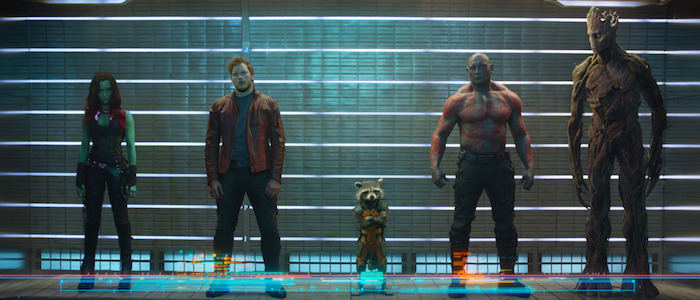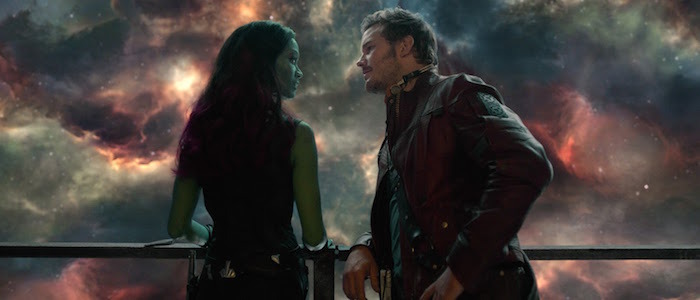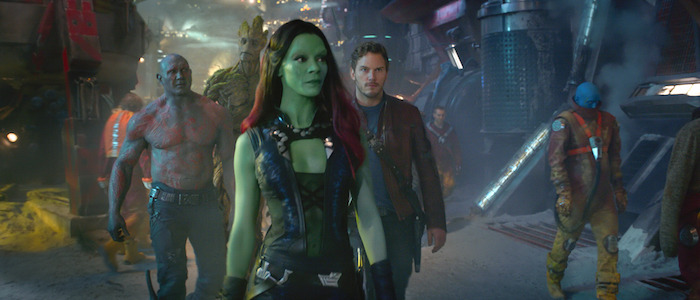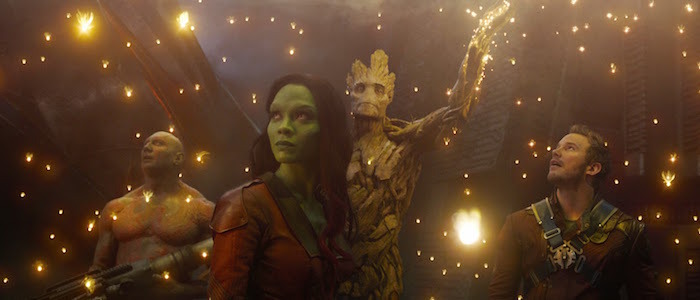'Guardians Of The Galaxy' Goes Cosmic And Gives Marvel Its Raw, Beating Heart
(Welcome to Road to Infinity War, a new series where we revisit the first 18 movies of the Marvel Cinematic Universe and ask "How did we get here?" In this edition: Guardians of the Galaxy gets weird, and it's spectacular.)
Flashback, Comic Con 2012. Marvel Studios head honcho Kevin Feige announces development on Guardians of the Galaxy, to which even seasoned Marvel readers respond: "Wait... Who?" Flashback, Comic Con 2013. Marvel plays the first public footage from the new James Gunn joint to a crowd who had no idea what to expect. I would know. I was there, buzzing with bewildered excitement. And from the moment we got a glimpse of this thing – a sizzle reel not dissimilar from the film's first trailer – we knew we were in for something special. Flash forward, April 2018. The Guardians' upcoming team-up with the Avengers is currently outselling the last seven Marvel movies combined.
Gunn's superhero space-opera existed independently of the rest of the Marvel Universe (unless you count post-credit scenes, which I do not) and it seemed to exist independently from most sci-fi films in general. Equal parts grimy and bursting with colour, it felt like bright new world that had been used and lived in by ingrates not unlike ourselves. From an idyllic, multi-species utopia led by Marvel's Nova Corps, to a floating space-penitentiary with alien inmates of all stripes, even to a mining colony within the severed head of an ancient Celestial, the film departed from its relatively grounded predecessors and marked Marvel Studios going full-Marvel Comics. While Asgard in Thor featured a familiar regality, Guardians of the Galaxy represented a major step out into the larger Marvel cosmos, starting off on Earth before ending up in far-flung corners of an unfamiliar universe – though not without the right characters to guide us through it.
Game of Tones
Guardians of the Galaxy bears a distinct structural similarity to The Avengers. And while the same could be said about any heist or team-up film on the surface – a band of misfits come together to pull-off a mission while becoming greater than the sum of their parts – the common thread these films share is distinctly in Marvel's comic book wheelhouse. After bringing together a tech billionaire, a frozen soldier, a green rage-monster, pair of assassins and a literal Norse God, Guardians had to pull off a similar feat with an even weirder set, that too without the luxury of having introduced them prior.
The disparate elements at play here come not only from different planetary backgrounds, but from seemingly different genres and tones. While Marvel had thus far established itself as a quip-laed action-comedy franchise, a modus operandi certainly carried over by the likes of Star-Lord/Peter Quill (Chris Pratt of Parks and Recreation), it also had to balance the cosmic classicism penned by comic greats like Jack Kirby and Jim Starlin without having it stick out awkwardly.
Thor and Loki were outsiders to Earth and their demeanor was treated as such, but the likes of Drax (Dave Bautista) and Quill exist side-by-side as a matter of simple fact. It's how you can have lines dripping with operatic grandeur, like "You are an honorable man. I will fight beside you. And in the end, I will see my wife and daughter" right next to semen jokes or references to Footloose delivered with nimble naturalism. It's why Gamora can deliver weighty poetry like "Whatever nightmares the future holds are but dreams compared to what's behind me" while learning to make Kevin Bacon references herself, and it's also why a sentient tree with the kindness of a Miyazaki creature can team up with a trash-talking, Joe Pesci-inspired cybernetic Racoon. It's why Thanos can make booming threats to "bathe the star-ways" with blood (Kenneth Branagh would've killed for this sort of space-set Shakespeare) while Michael Rooker's Yondu can speak literal gibberish just to mess with another character — look, I can do this all day.
The point is, after The Avengers, audiences had been conditioned to accept an "anything goes" approach in their superhero movies. A big-risk blockbuster like Guardians of the Galaxy was now well within the realm of the possible when even Star Wars had to maintain a consistent feel of old-world adventure. The teaming-up of characters that felt like they were from entirely different genres was now a totally normal occurrence, woven together by Super director and Troma alumnus James Gunn, likely hired because of his penchant for humanizing the weird, not to mention to his eye for externalizing loneliness. Guardians' bizarre mixture doesn't just work because the characters stand within the same psychical space. It works because they're bound thematically by similar backgrounds, which Gunn was given relative carte blanche to write. These obscure oddities were barely at the mercy of fan expectation, and even if they were, their on-screen avatars bear little resemblance to their respective comicbook counterparts. As much as this was Gunn making a Marvel movie, it was also Gunn getting to tell his own kind of story.
My Little Star-Lord
Marvel's first man-out-of-time is a super soldier clinging to the righteousness of World War II. Its second addition to that shelf however, is a man-child stuck in the '80s. He makes constant allusions to its popular culture, the kind of commodified nostalgia that we ourselves are still in the midst of, but Peter Jason Quill isn't just childish for childishness' sake. He's locked in arrested development, forever frozen in the moment he refused to reach out and take his mother's hand as she died. Cutting himself off from feeling her death was the easier option.
Once a sweet kid who got into fights to protect innocent frogs, the first thing we see him do as an adult is kick around innocent space lizards on his way to stealing an ancient artifact. What's more, he does so while listening to a mixtape his mother left him. He even calls himself Star-Lord, fashioning an outlaw persona after his mother's nickname for him, but he uses it only to manipulate. He knows, deep down, this connection is important to him, but he expresses it only through anger, lashing out violently at anyone who touches his Walkman or listens to the music over which he claims ownership. Emotional vulnerability knocks constantly at his door but he has no idea how to let it in, turning his back on vulnerability even in moments of genuine heroism. When he risks his life to save Gamora, a scenario that'll end badly either way since he calls on enemy Ravagers for rescue, he turns Gamora's adoration of his selflessness into an opportunity to gloat.
After being kidnapped the moment his mother died, Quill hasn't reached out to anyone else in decades. But when he's inadvertently placed in charge of this mismatched posse, a group that has it as bad and in some ways worse than he does, he steps up to take charge. At first, out of greed, but eventually because there's something more to him than apathy. It's just been waiting for an opportunity to show itself.
The Broken Avengers
Quill isn't the only one who responds to intimacy with anger. The first time Gamora gets to slow down and feel something – a scene pivoting around the Walkman, no less – she snaps out of this romantic moment and puts a knife to Quill's throat. Everyone seems to want her dead, owing to her violent past and her alignment with Thanos. And while a gradual turn towards betraying the Mad Titan may have been more interesting, her immediate defection means she starts out with a clear moral compass. The same can't be said for Guardians like Drax and Rocket. They look only inward until the situation is dire, though not without good reason.
Drax is consumed by anger and by his thirst for vengeance. He's a literalist on a linear path, swayed from his desire to kill Gamora only when Quill convinces him that keeping her alive may lure in his bigger targets. His wounds are genuine, having seen his wife and daughter murdered in front of him, but he's so focused on revenge that he doesn't care who else he endangers. He draws Ronan the Accuser (a thankless role made watchable by Lee Pace's charisma) straight to his location on Knowhere while the other Guardians are distracted. It isn't until the lot of them lie defeated, and that he draws the ire of Rocket, that he realizes he now has people in his life whom his actions can affect.
Rocket's temporary grudge stems from the way Drax treats him. While Drax has no means of disguising his language and likely doesn't intend any harm, being called a rodent and being made to stand out in public unearths the creature's deep-seated issues. Torn apart and re-assembled in a lab experiment, he leans on his uniqueness as a means to obscure the fact that being one-of-a-kind means being alone, not to mention being pissed off about it. His companion Groot appears to be the only person whose words can't hurt him, since all he can say is "I am Groot," but Groot himself serves as a nice example to the rest of the Guardians. All they really do is insult his intelligence – it's hard to say if he even understands them on an intellectual level – but he's a creature who just wants to bring a little light into the world, whether it's handing a little girl a glowing flower, or smiling giddily when he takes down a group of enemies to save his new best friends.
We Are Groot
Groot's sacrifice to save his team is allowed to have meaning because the Guardians deserve to be saved. Or rather, they've come to deserve it after deciding, like a "bunch of jackasses standing in a circle," to take the opportunity life has given them and make a positive difference. Saving the Guardians means saving the rest of the galaxy. The Guardians aren't alone either, as Yondu's Ravagers and the Nova Corps all put aside their differences with the Guardians in order to oppose Ronan. It's a story of wildly different people coming together, and it crystalizes in the moment Peter Quill gets his hands on Ronan's Infinity Stone. First, because Quill distracts him with a dance-off – that the fate of the universe being decided by The Five Stairsteps is a thing of wonder – and second, because Quill finally reaches out.
Quill can't handle the Power Stone on his own, but he manages to wield it with the help of his friends. The key word there is friends, people he's managed to inspire and people who he's stood by. His arc reaches its climax when life, once again, gives him an opportunity. Reaching out for Gamora's hand isn't just a means to distribute the Stone's energy. It's a means for Quill to accept, once and for all, that he needs other people and he's ready to accept their help. Whether a figment of his mind or the Stone opening some sort of universal portal, Gamora's screams of "Take my hand!" echo Quill's mother's, conjuring her very image in front of him. This time, he chooses not to cut himself off from the love he's offered, and from sharing his pain with other people. This time, he reaches back. And it's in reaching back, and in others reaching out to him, that he's able to save the day.
This opens up a vital thread for the Marvel universe in the long run. The Avengers, as great as it is, depends on individuals growing parallel to one another before joining forces. Guardians of the Galaxy goes a step further, despite not having nearly the same action highs. It posits characters growing because of one another as its own form of superheroism, not unlike Captain America: The Winter Soldier. That Guardians ties this emotional mechanism to a cosmic stone is something that may or may not come up again (it arguably has in Doctor Strange, which we'll get to), but establishing the Guardians as something of a family is a vital piece of the Marvel puzzle.
Their dynamic is put to the test in the arguably superior sequel, but its shared-universe payoff will likely show up in Infinity War, wherein a broken team of Avengers is contrasted with a family of misfits still mostly intact, lifting each other up as they move forward together. If Captain America: The First Avenger is the moral center of this universe, Guardians of the Galaxy is its beating heart.




